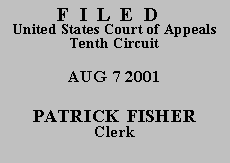

| CHARLES R. MCMILLAN, | |
| Petitioner-Appellant, | |
| v. | |
| DAVID R. MCKUNE; ATTORNEY GENERAL FOR THE STATE OF KANSAS, | |
| Respondents-Appellees. |
State prisoner Charles R. McMillan seeks to appeal from the dismissal of his 28 U.S.C. § 2254 habeas petition. Petitioner pleaded guilty to felony murder for which he was sentenced to life imprisonment. Petitioner sought a writ of habeas corpus in the United States District Court for the District of Kansas, alleging that the state trial court erred in: (1) denying a motion to withdraw plea without an evidentiary hearing; (2) not appointing counsel to withdraw plea; (3) not producing proof of the factual basis for felony murder and the underlying felony charge; and (4) not fully informing Petitioner that his constitutional rights were waived upon acceptance of a guilty plea. The district court denied the petition, holding that Petitioner's first and second assignments of error did not implicate federal law and that Petitioner's third and fourth claims were unsupported by the evidence in the state court record. Finding no merit to any of Petitioner's arguments, the court declined to grant Petitioner a certificate of appealability as required by 18 U.S.C. § 2253(c) to appeal his § 2254 petition. Petitioner then applied to this court for a certificate of appealability.
In order for this court to grant a certificate of appealability, Petitioner must make a "substantial showing of the denial of a constitutional right." 28 U.S.C. § 2253(c)(2). To do so, Petitioner must demonstrate that "reasonable jurists could debate whether (or, for that matter, agree that) the petition should have been resolved in a different manner or that the issues presented were adequate to deserve encouragement to proceed further." Slack v. McDaniel, 529 U.S. 473, 484 (2000) (quotations omitted).
We have carefully reviewed Petitioner's brief, the disposition of the district court, and the record on appeal. We now conclude that for substantially the same reasons as set forth by the district court in its Memorandum and Order of October 13, 2000, we cannot say that "reasonable jurists could debate whether (or, for that matter, agree that) the petition should have been resolved in a different manner." Slack, 529 U.S. 473 at 484 (quotations omitted). We thus deny Petitioner's request for a certificate of appealability.
Petitioner further moved both the district court and this court to proceed in forma pauperis on appeal. After Petitioner had filed his application to this court, the district court granted his motion. We therefore dismiss Petitioner's motion in this court to proceed in forma pauperis as moot.
Accordingly, we DENY Petitioner's request to proceed in forma pauperis on appeal as moot, DENY him a certificate of appealability, and DISMISS the appeal.
Entered for the Court
Monroe G. McKay
Circuit Judge
*. This order and judgment is not binding precedent, except under the doctrines of law of the case, res judicata, and collateral estoppel. The court generally disfavors the citation of orders and judgments; nevertheless, an order and judgment may be cited under the terms and conditions of 10th Cir. R. 36.3.